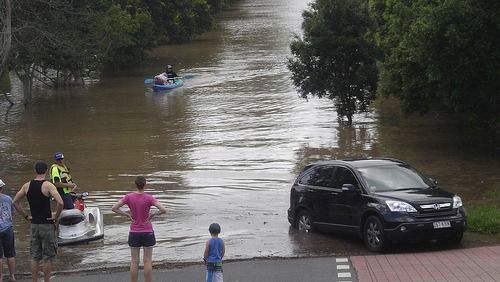Direct experience boosts public climate concerns
People are much more likely to save energy and try to mitigate climate change if they have been directly affected by extreme weather events, such as flooding, according to new research. New research suggests that people’s perceptions of climate change increases with impacts experienced in our day-to-day lives, making research linking climate change and individual weather events more important than ever.

 People are more likely to be concerned about climate change, and therefore limit their energy use, if they have directly experienced a climatic weather event, such as flooding, according to new research.
People are more likely to be concerned about climate change, and therefore limit their energy use, if they have directly experienced a climatic weather event, such as flooding, according to new research.
The research published in the latest edition of Nature: Climate Change found that those people who have experienced local flooding in the UK would be more concerned about climate change, feel more vulnerable to it and have a higher sense of duty to prevent it. The authors believe this will offer a “useful strategy for increasing concern and action.”
Co-author Dr Alexa Spence, from the School of Psychology at Nottingham University said: “Our research indicates that extreme weather events, which are likely to become more frequent, offer a really important opportunity to engage the public on climate change. We can, for example, discuss specific events in terms of their increased frequency, and highlight their relationships to the IPCC predictions for climate change.
“Making climate change impacts real and tangible is really important in engaging the public.”
Dr Spence acknowledges, however, the complexity in linking specific weather events to climate change, but points towards the potential of research such as that done by Oxford University last month that linked the flooding in the UK in 2000 to climate change.
The research, a survey of over 1,800 people across the UK found positive trends in all areas from those who had experienced flooding. Those who had lived through the weather event had higher levels of concern for climate change; were more certain about climate change existing; felt more vulnerable to it; and most importantly, according to the authors felt they had the ability to have an effect on climate change.
A similar trend was seen in research done by the Joseph Rowntree Foundation. While looking at the impact that flooding could have on coastal communities in the UK, they found that those who had already experienced some level of flooding found the effects of climate change on their community a much bigger issue.
However, the researchers also acknowledge the opposite trend that those who are most concerned about climate change, may report more local flooding than those who are not.
Dr Spence said: “It is theoretically possible that a greater understanding, salience, or concern about climate change may make people more aware of local flooding that may have affected them in some way…However, we propose that the reverse pathway is likely to be weaker than the pathway from flooding experiences to perceptions of climate change.”
As the UK experiences more frequent weather events linked climate change, while at the same time increasing media coverage, IPCC reports, and International events such as the Copenhagen Climate Conference leads to increased salience around the issue, the authors believe this is an opportunity to study the public’s ability to link the two, and whether this will work to engage and encourage action.
Image: Elspeth and Evan | flickr
